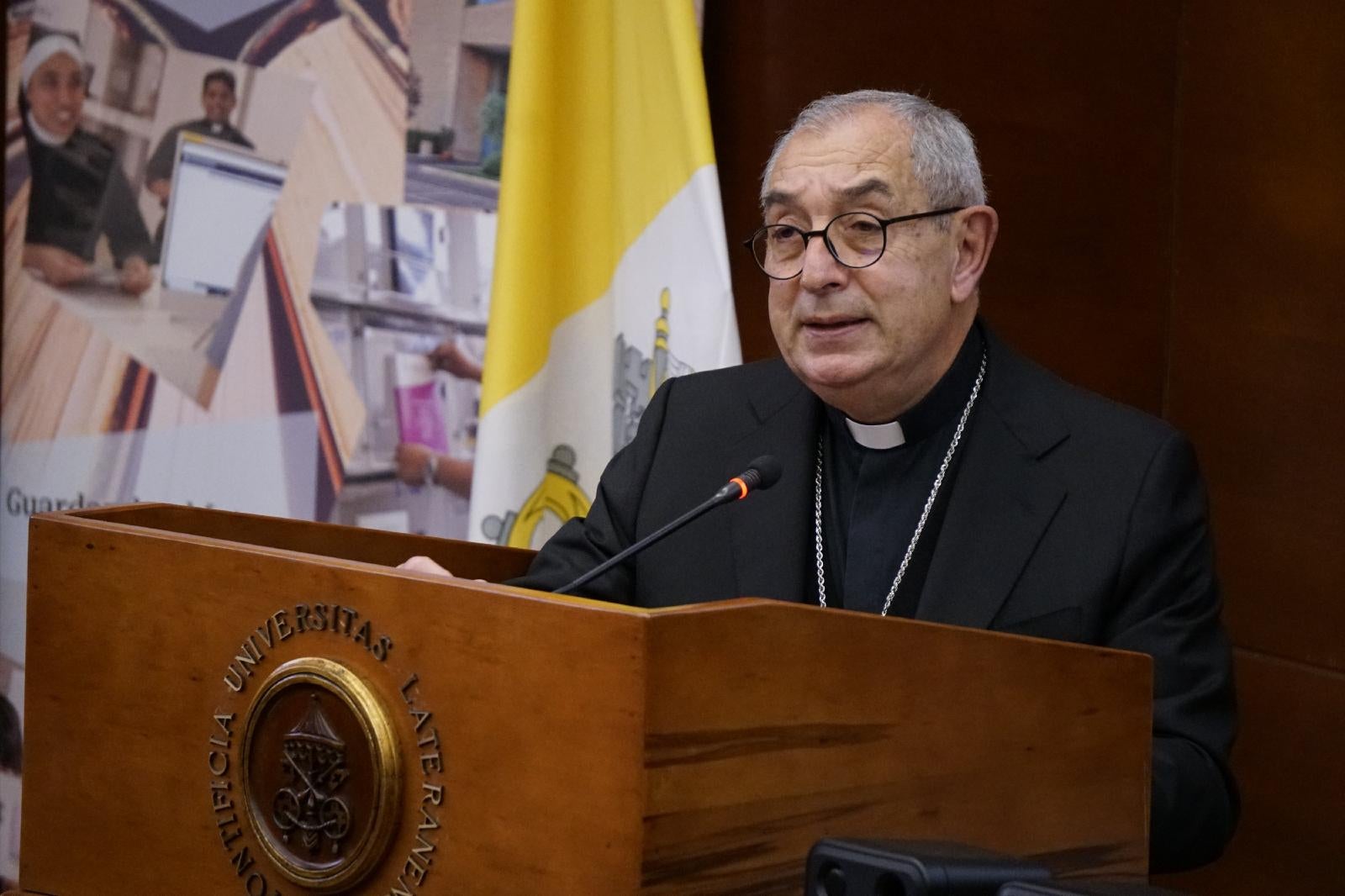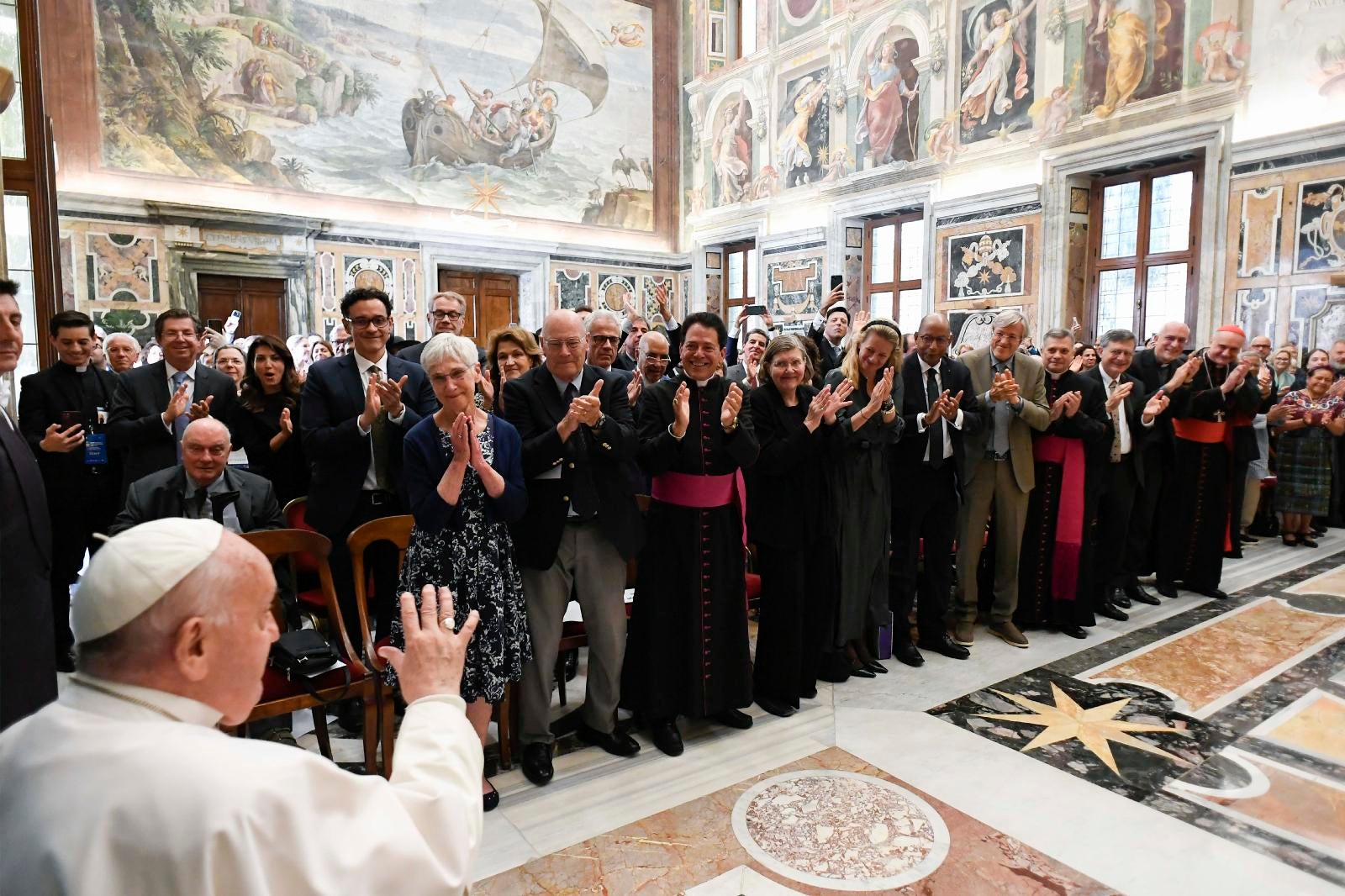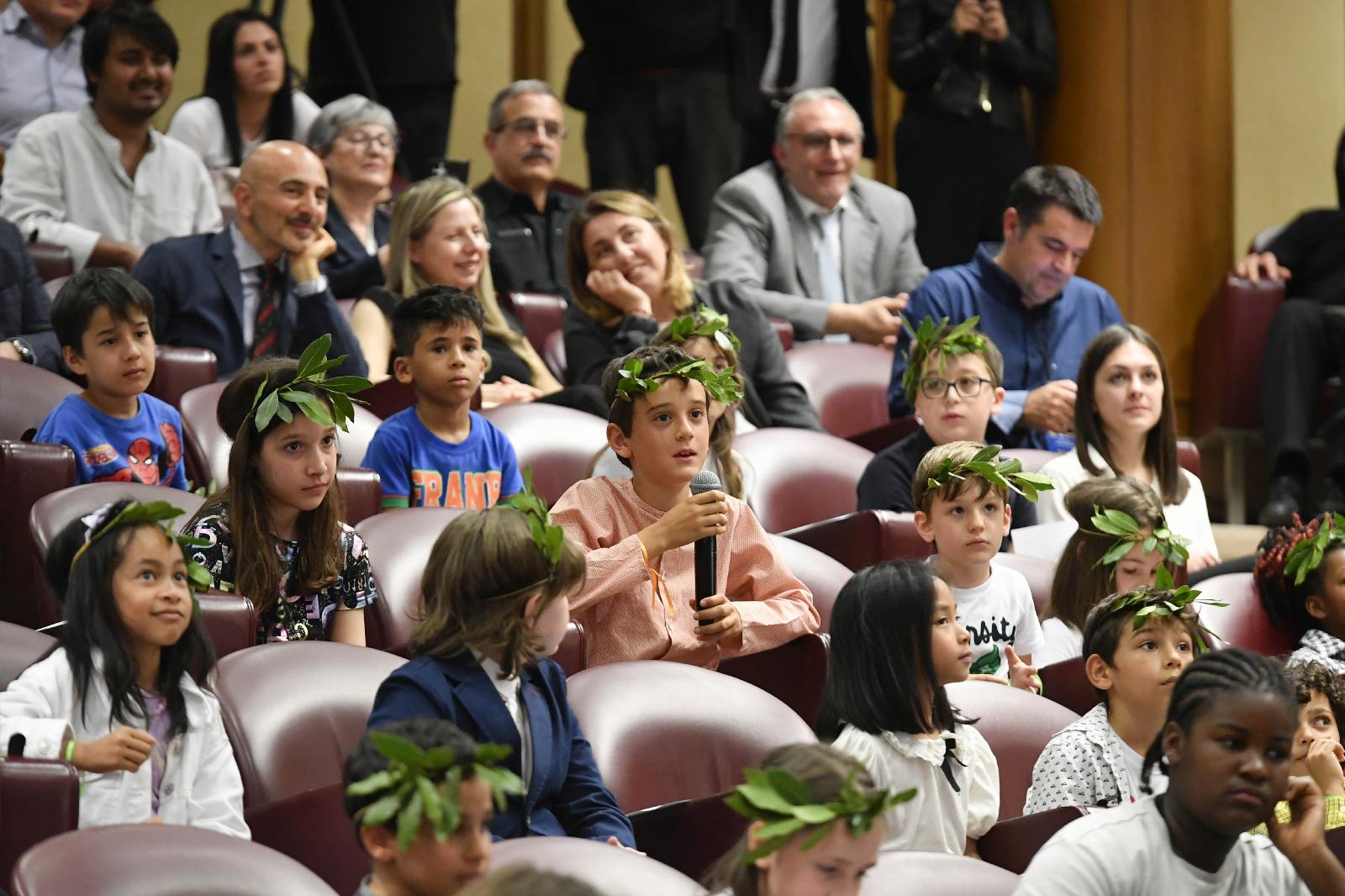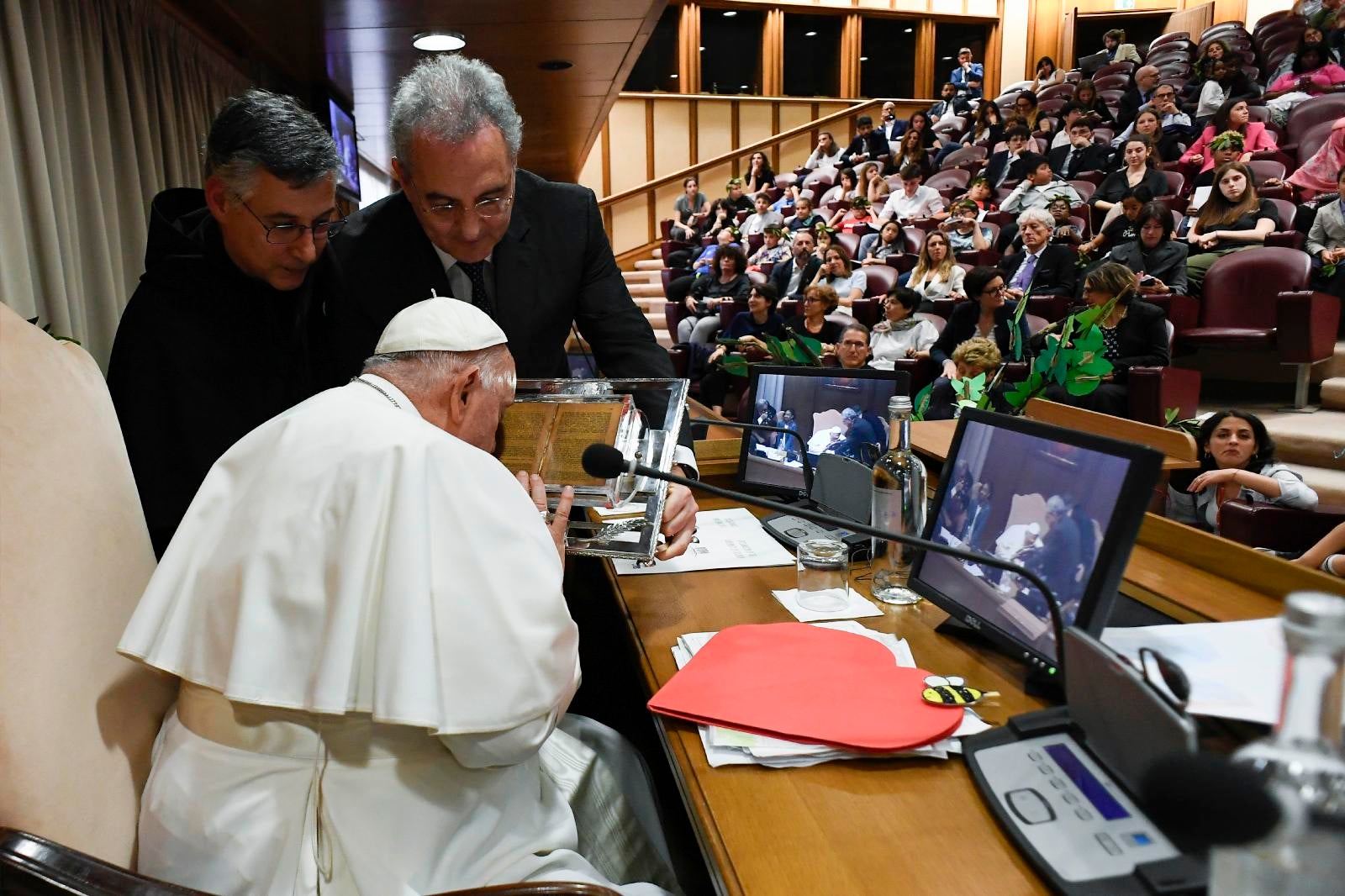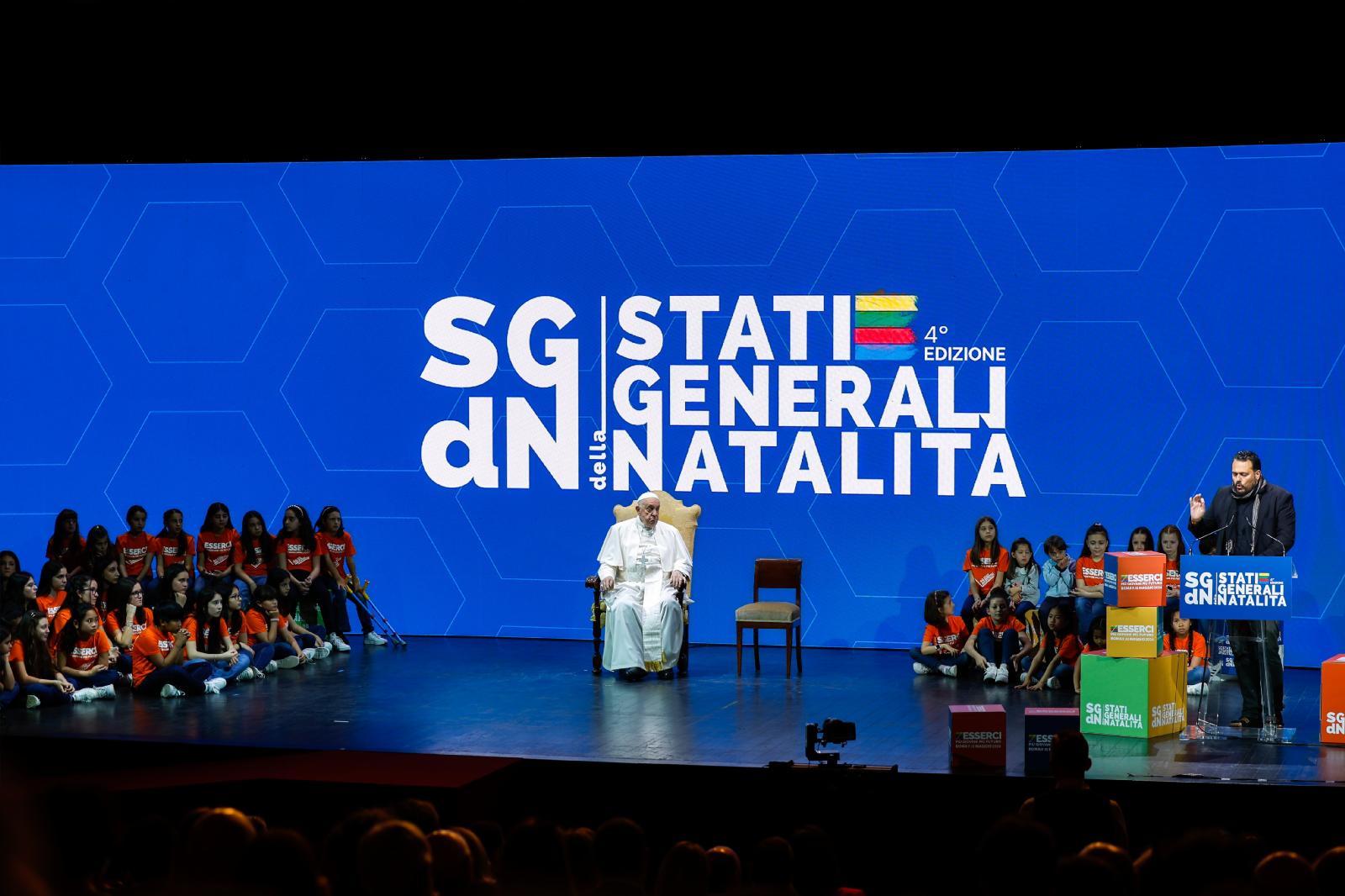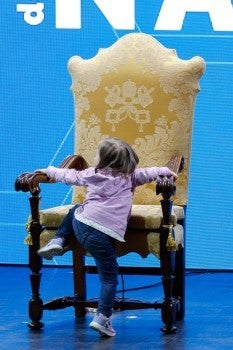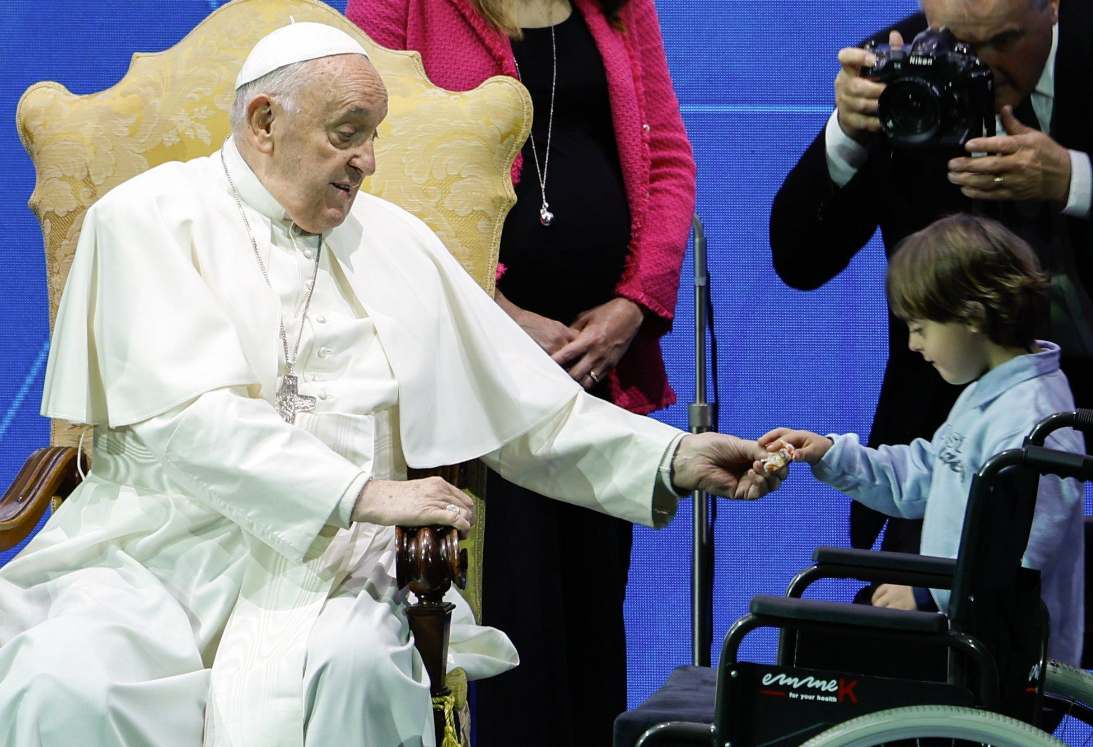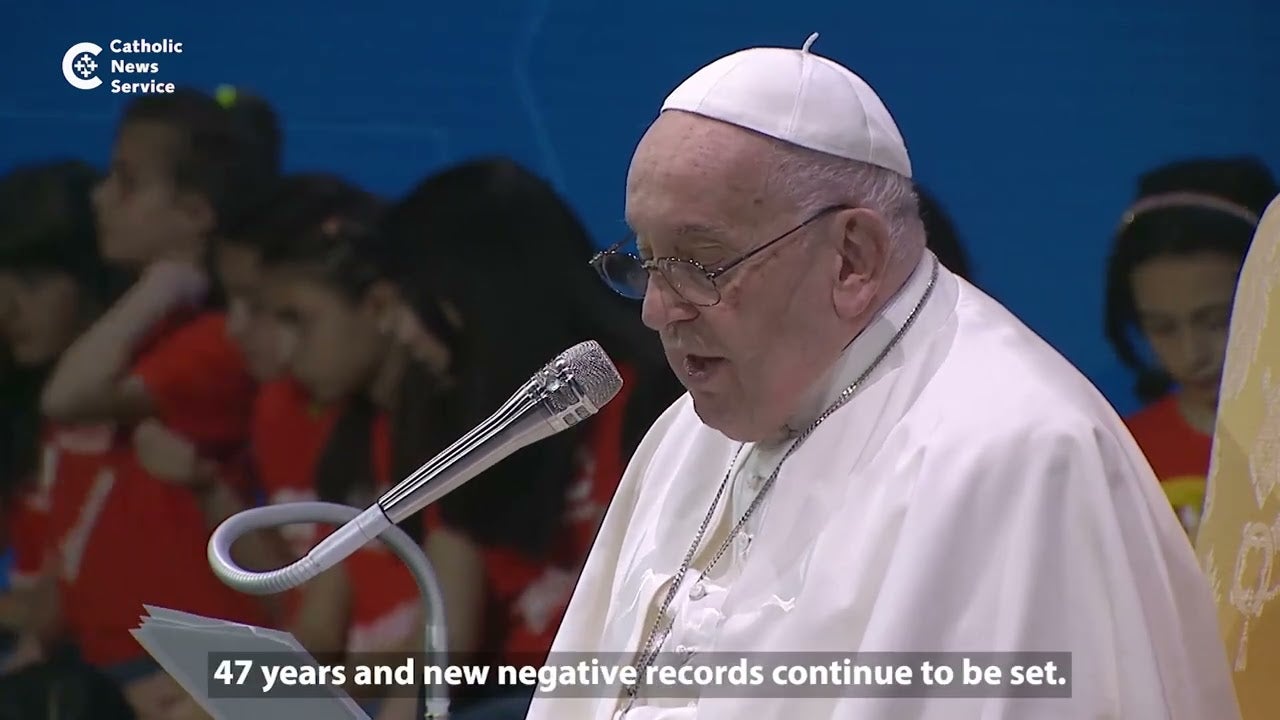Browsing News Entries
‘Rezar el rosario nos lleva a una relación más íntima con María’
Posted on 05/13/2024 20:00 PM (Miami Archdiocesan News)
U.S. Bishops to Meet June 12-14 in Louisville; Assembly to Be Live Streamed
Posted on 05/13/2024 08:30 AM (USCCB News)
This release has been edited to include the National Review Board's update to the bishops on the plenary agenda.
WASHINGTON - The United States Conference of Catholic Bishops (USCCB) will gather for the 2024 Spring Plenary Assembly in Louisville, Kentucky, June 12-14. The public sessions on June 13 and 14 will be livestreamed on the USCCB website.
The public portion of the assembly will begin with addresses by Cardinal Christophe Pierre, the papal nuncio to the United States, and Archbishop Timothy P. Broglio of the Archdiocese for the Military Services, USA, who serves as president of the Conference.
During the plenary, the bishops will receive updates on various issues and initiatives. The meeting agenda is not yet finalized and therefore, subject to change. However, it is expected to include updates on: the Committee on Migration; the bishops’ national mental health campaign; the Synod on Synodality; the Task Force for a National Directory for Instituted Ministries; the National Eucharistic Revival and the National Eucharistic Congress; and the National Review Board. The bishops will also hold a consultation on opening the cause for beatification and canonization of Adele Brise.
Votes are expected on a number of action items including:
- Three action items on liturgical texts pertaining to the Liturgy of the Hours, presented by the USCCB’s Committee on Divine Worship.
- Listen, Teach, Send: A National Pastoral Framework for Ministries with Youth and Young Adults, by the USCCB’s Committee on Laity, Marriage, Family Life, and Youth.
- Keeping Christ’s Promise: A Pastoral Framework for Indigenous Ministry, a pastoral plan for Native American and Indigenous Ministry by the USCCB’s Subcommittee on Native American Affairs.
Prior to the public sessions, the bishops will spend time in prayer and fraternal dialogue with one another. They will also be reflecting on positioning the Catholic Campaign for Human Development (CCHD) for the future. For a half-century, grants made possible through the annual CCHD collection have gone to help community organizations working to empower people striving to overcome poverty. Now, the bishops have begun the process of discerning the next 50 years.
Over the past several years, including during the pandemic, the CCHD maintained its level of support for those in need, despite a decline in donations. Last year, the CCHD started a review to explore ways to renew the mandate and mission of CCHD. The bishops will spend time prayerfully discussing the best way to adapt to the post-pandemic needs and resources, while at the same time continuing a steadfast commitment to helping the poor and disenfranchised emerge from the cycle of poverty.
Public sessions of the assembly will be held on the afternoon of June 13 and the morning of June 14, and livestreamed at: www.usccb.org/meetings -- news updates, vote totals, texts of addresses and presentations, and other materials will be posted to this page. Those wishing to follow the meeting on social media can use the hashtag #USCCB24 follow on Facebook (www.facebook.com/usccb), as well as Instagram (https://instagram.com/usccb), Threads (www.threads.net/@usccb), and X, formerly known as Twitter (@USCCB).
###
Vatican norms for Jubilee indulgence include pilgrimage, penance, service
Posted on 05/13/2024 08:30 AM (USCCB News)
VATICAN CITY (CNS) -- Pilgrims passing through the Holy Door of St. Peter's Basilica during the Holy Year 2025, going to confession, receiving Communion and praying for the intentions of the pope can receive an indulgence, but so can inmates in prison and those who work to defend human life or assist migrants and refugees.
Fasting "at least for one day of the week from futile distractions" such as social media also can be a path toward a jubilee indulgence, according to norms published by the Vatican May 13.
Pope Francis said he will open the Holy Year at the Vatican Dec. 24 this year and close it Jan. 6, 2026, the feast of Epiphany. But he also asked bishops around the world to celebrate the Jubilee in their dioceses from Dec. 29 this year to Dec. 28, 2025.
For centuries a feature of holy year celebrations has been the indulgence, which the church describes as a remission of the temporal punishment a person is due for their sins.
"Every sin 'leaves its mark'" even after a person has received forgiveness and absolution through the sacrament of reconciliation, Pope Francis wrote in the document proclaiming the Holy Year. "Sin has consequences, not only outwardly in the effects of the wrong we do, but also inwardly, inasmuch as 'every sin, even venial, entails an unhealthy attachment to creatures, which must be purified either here on earth, or after death, in the state called Purgatory,'" he wrote, quoting the Catechism of the Catholic Church.
The norms for receiving an indulgence during the Holy Year were signed by Cardinal Angelo De Donatis, the new head of the Apostolic Penitentiary, a Vatican court dealing with matters of conscience and with the granting of indulgences.
The basic conditions, he wrote, are that a person is "moved by a spirit of charity," is "purified through the sacrament of penance and refreshed by Holy Communion" and prays for the pope. Along with a pilgrimage, a work of mercy or an act of penance, a Catholic "will be able to obtain from the treasury of the Church a plenary indulgence, with remission and forgiveness of all their sins, which can be applied in suffrage to the souls in Purgatory."
The Rome pilgrimage, Cardinal De Donatis said, can be to the papal basilicas of St. Peter's, St. Mary Major, St. John Lateran or St. Paul Outside the Walls. But also to one of the churches connected to outstanding women saints and doctors of the church: St. Catherine of Siena at the Basilica of Santa Maria sopra Minerva; St. Brigid of Sweden at Campo de' Fiori; St. Teresa of Avila at the Church of Santa Maria della Vittoria; St. Thérèse of Lisieux at Trinità dei Monti; and St. Monica at the Church of St. Augustine.
Pilgrims to the Holy Land also can receive the Holy Year indulgence by praying at the Basilica of the Holy Sepulcher in Jerusalem, the Basilica of the Nativity in Bethlehem or the Basilica of the Annunciation in Nazareth.
For those who cannot travel abroad, local bishops around the world can designate their cathedral or another church or sacred place for pilgrims to obtain the indulgence, the cardinal wrote, asking bishops to "take into account the needs of the faithful as well as the opportunity to reinforce the concept of pilgrimage with all its symbolic significance, so as to manifest the great need for conversion and reconciliation."
People who cannot leave their residence -- "especially cloistered nuns and monks, but also the elderly, the sick, prisoners and those who, through their work in hospitals or other care facilities, provide continuous service to the sick" -- can spiritually join a pilgrimage and receive the indulgence, according to the norms.
Visiting the sick or a prisoner, feeding the hungry, clothing the naked or welcoming a migrant, "in a sense making a pilgrimage to Christ present in them," can be another way to receive the indulgence, the cardinal said, adding that an indulgence could be obtained each day from such acts of mercy.
"The Jubilee Plenary Indulgence can also be obtained through initiatives that put into practice, in a concrete and generous way, the spirit of penance which is, in a sense, the soul of the Jubilee," he wrote, highlighting in particular abstaining on Fridays from "futile distractions" like social media or from "superfluous consumption" by not eating meat.
"Supporting works of a religious or social nature, especially in support of the defense and protection of life in all its phases," helping a young person in difficulty or a recently-arrived migrant or immigrant -- anything involving "dedicating a reasonable portion of one's free time to voluntary activities that are of service to the community or to other similar forms of personal commitment" also are paths toward an indulgence, he said.
"Despite the rule that only one plenary indulgence can be obtained per day," Cardinal De Donatis wrote, "the faithful who have carried out an act of charity on behalf of the souls in Purgatory, if they receive Holy Communion a second time that day, can obtain the plenary indulgence twice on the same day," although the second indulgence is "applicable only to the deceased."
‘You are called to be in his presence’
Posted on 05/11/2024 20:00 PM (Miami Archdiocesan News)
Peace in politics, in the world starts in people's hearts, pope says
Posted on 05/11/2024 08:30 AM (USCCB News)
VATICAN CITY (CNS) -- Believing security can be obtained through war and fear is a great deception, Pope Francis said.
"To guarantee lasting peace, we must return to a recognition of our common humanity and place fraternity at the center of peoples' lives," he told participants in a conference on human fraternity.
"Political peace needs peace of hearts, so that people can meet in the confidence that life always triumphs over all forms of death," he said in his talk during a late morning audience at the Vatican May 11.
The pope met with some 350 participants of the World Meeting on Human Fraternity being held May 10-11. Organized by the Vatican's Fratelli Tutti Foundation, the conference brought Nobel laureates, government officials, scientists, experts, athletes and artists to a series of roundtable discussions across Rome and at the Vatican to discuss specific themes aimed at strengthening solidarity and peace.
Those attending the conference included: New York Mayor Eric Adams; Muhammad Yunus, recipient of the 2006 Nobel Peace Prize; Graça Machel Mandela, former first lady of both South Africa and Mozambique; the former quarterback, Tom Brady; and NASA administrator, Bill Nelson. U.S. country singer, Garth Brooks, was scheduled to be part of a late evening concert held in front of St. Peter's Basilica May 11.
In his address, the pope quoted the Rev. Martin Luther King Jr., who said, "We've learned to fly the air like birds, we've learned to swim the seas like fish, and yet we haven't learned to walk the Earth as brothers and sisters."
"War is a deception. War is always a defeat, as is the idea of international security based on the deterrent of fear," the pope said. "It is another deception."
"In a planet in flames, you have gathered with the intention of reiterating your 'no' to war and 'yes' to peace, bearing witness to the humanity that unites us and makes us recognize each other as brothers and sisters, in the reciprocal gift of the respective cultural differences," he told conference participants.
One of the conference's aims was to renew the Declaration on Human Fraternity released at the first conference in Rome in 2023 and to draft a new "Charter of Humanity" outlining a "grammar" or code of choices and behaviors needed to build fraternal coexistence in a world marked by uncertainty and fear.
In his speech, the pope underlined the importance of compassion and he encouraged everyone "to make this spirituality of fraternity grow, and to promote, through your diplomatic action, the role of multilateral bodies."
Only by recognizing everyone is part of a common humanity and putting fraternity at the center of peoples' lives "will we succeed in developing a model of coexistence capable of giving the human family a future," he said.
Later in the afternoon, the pope attended a special roundtable, dedicated to children and future generations, held in the Vatican Synod Hall.
The moderator told the pope that a group of special "scientists" had to be introduced before they could start the meeting in the half-empty hall. As the music to "A Thousand Years" played, scores of children walked into the hall wearing crowns made of laurel leaves.
They held paper leaves with words of wisdom written on them and handmade drawings they gave the pope. Some stayed with the pope, sitting next to him behind the dais.
In an informal exchange, the pope asked the children what happiness was and where it could be found. "I love you very much!" was the first and fourth response.
Those who kept on topic answered, "to be united together," "to be part of a family," when everyone is doing well, by loving one another, by staying in touch with God and when there is peace.
Peace, they said, can be found when people speak nicely to one another, and insults only cause unhappiness.
Pope Francis then asked them if they understood there were children in the world suffering from hunger and war, and whether they thought the children on "the other side" of a war were enemies.
"No!" they shouted, with one explaining the reason was that war "is not their fault" and "all children are part of one family."
One child asked the pope to pray for his grandmother, and the pope led everyone in praying the Hail Mary for everyone's grandparents, ending with the cheer "Long live grandparents!" and explaining how the future depends on young and old working together.
The pope signed a copy of a declaration crafted by the children expressing what fraternity means to them, and he blessed a relic of Blessed Pino Puglisi of Palermo, who spoke out against the Mafia and helped underprivileged children. The priest was murdered in 1993 by order of local Mafia bosses. The relic was a small Gospel that had been buried with him and had remained intact and found when his body was exhumed.
World's ills rooted in too much greed, not too many babies, pope says
Posted on 05/10/2024 08:30 AM (USCCB News)
ROME (CNS) -- Blind, unbridled consumerism and selfishness -- not the number of people on the planet and having children -- are the root causes of the world's problems, Pope Francis said.
The reasons for pollution and world hunger, for example, are not based on the number of children being born, but on "the choices of those who think only of themselves, the delusion of unbridled, blind and rampant materialism, of a consumerism that, like an evil virus, erodes at the root the existence of people and society," he said.
"Human life is not a problem, it is a gift," he said. "The problem is not how many of us there are in the world, but what kind of world we are building."
Pope Francis made his remarks at a meeting in Rome May 10 on Italy's longtime decline in births and population growth.
The annual conference focuses on the general state of Italy's birthrate and demographics and seeks to bring all sectors of society together to pursue concrete ways to reverse the country's steeply declining birthrate. Sponsored by the Foundation for Natality and with the support of the Italian Forum of Family Associations and the city of Rome, the conference was held May 9-10 at a Rome auditorium not far from St. Peter's Square.
Italy has had one of the lowest birthrates in the European Union for years. According to the Italian National Institute of Statistics, Italy continued to register less than 7 births per 1,000 people last year and saw 14,000 fewer births than in 2022. Italy's fertility rate dropped to 1.2 in 2023 from 1.24 in 2022.
However, its population registered a decline of only 0.3% from last year due to increased migration and to fewer people leaving the country, the institute said.
Gianluigi De Palo, president of the Foundation for Natality, said in his talk before introducing the pope, that the group's mission is to encourage Italy's demographic winter to turn into springtime.
"Not because we are worried about who will pay for our pensions or who will support the national health care system, but because we want our children to be free" to choose what they want to do with their future, he said.
"It is not about convincing young people to have more children; it is not about convincing couples, families, women to have children," he said.
The problem is that having children is one of the primary causes of poverty in Italy, "and this is unacceptable," he said. People may feel free to not have children if they do not want them, but that freedom is denied to those who want to have children "but are not in a position to have them."
Nothing concrete has been done, he continued, to actually enact or strengthen measures and policies that people agree with, such as more public child care centers and better parental leave.
In his talk, Pope Francis said the root cause of problems in the world "is not babies being born: it is selfishness, consumerism and individualism, which make people satiated, lonely and unhappy."
"Selfishness makes one deaf to the voice of God, who loves first and teaches how to love, and to the voice of the brothers and sisters around us; it anesthetizes the heart," making people live for things and possessions, losing the capacity to know "how to do good."
Homes become "very sad places," he said, emptied of children and "filled with objects," dogs or cats.
The pope said what is needed are long-term approaches, effective policies and bold, concrete decisions so that what seeds are sown today, children "can reap tomorrow."
"Serious and effective family-friendly choices" need to be made, he said. For example, women should never be put in a position where they have to choose between work and childcare, and young people should not carry the paralyzing burden of job insecurity and the inability to buy a home.
There should also be more intergenerational solidarity and generosity, the pope said.
Older generations should reassess their habits and lifestyles, "giving up what is superfluous in order to give the youngest hope for tomorrow" and, he said, younger generations should recognize and show gratitude for the sacrifices and hard work of those who helped them grow, he added.
In every discussion about birthrates and demographics, he said, do not forget to emphasize the importance of grandparents playing an active role in families.
It is "cultural suicide" to "discard" grandparents or let them live solitary lives, he said.
"The future is made by young and old together. Courage and memory together," he said.
"These are the values to uphold, this is the culture to spread, if we are to have a tomorrow," he said.
May prayer intention: For the formation of men and women religious, and seminarians
Posted on 05/8/2024 07:15 AM (Miami Archdiocesan News)
Wenski Groves, affordable, permanent housing for working poor
Posted on 05/7/2024 20:00 PM (Miami Archdiocesan News)
Getting a GRRP on housing
Posted on 05/6/2024 20:00 PM (Miami Archdiocesan News)
A bust in memory of Father Camiñas at the Shine of Our Lady of Charity
Posted on 05/5/2024 20:00 PM (Miami Archdiocesan News)


